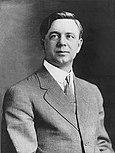William Samuel Sadler was an American psychiatrist and author who played a key role in the creation of the The Urantia Book and the spiritual and philosophical movement it spawned. A native of Indiana, he moved to Michigan to work at the Battle Creek Sanitarium as a teenager and became acquainted with John Harvey Kellogg. Sadler was influenced by some of Kellogg's views, and married his niece, Lena Celestia Kellogg. As a young man, Sadler worked for several Christian missionary and charitable organizations and attended American Medical Missionary College. He graduated in 1906 and studied psychiatry in Europe under Sigmund Freud in 1910. After finishing his education, Sadler practiced medicine in Chicago as a surgeon and psychiatrist. He joined several medical associations, and taught at the McCormick Theological Seminary and the Post-Graduate Medical School of Chicago. In 1907, along with his wife, Sadler became a speaker on the Chautauqua adult-education circuit. He eventually became a highly-paid, popular speaker. He wrote many books on a variety of medical and spiritual topics, advocating a holistic approach to health. Although he was a committed member of the Seventh-day Adventist Church for almost twenty years, he left the church after the excommunication of John Harvey Kellogg in 1907. Nevertheless, Sadler extolled the value of prayer and religion, but embraced scientific consensus and was skeptical of mediums. He worked with Howard Thurston in his efforts to debunk psychics. Around 1911, Sadler attempted to treat a patient with an unusual sleep condition. While sleeping, the man spoke to Sadler and claimed to be an extraterrestrial. After unsuccessful attempts to explain the phenomena, Sadler decided that the man's statements were accurate. For many years, Salder and a small number of assistants visited the man while he was sleeping to converse about spirituality, history, and cosmology. A larger number of interested people met as a group at Sadler's home to discuss the man's responses and to suggested additional questions. The man's words were eventually compiled in The Urantia Book, and the Urantia Foundation was created to spread its message. Although it never became the basis of an organized religion, the book attracted committed followers who devoted themselves to its study. Sadler had close ties to the Urantia Foundation until his death in 1969.
